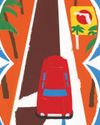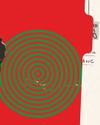CATEGORIES
Kategorier

Culture & Critics - “How Did I End Up Like This?”
Seamus Heaney’s journey into darkness

Hygiene is Overrated
But keep washing your hands.

Can An Unlove Child Learn to Love?
Thirty years ago, the world discovered tens of thousands of children warehoused in Romanian orphanages, deprived of human contact and affection. They’re adults now.

FICTION - Deep Cut
“Naw, you don’t have to worry about me,” Thomas said, after his mother had finished her characteristically perfunctory warning to us about drugs, alcohol, and rough-looking types. “Paul thinks he’s cool now, though.” ¶ “Paul, when did this happen?” Mrs. Rickley said. ¶ She wasn’t a hip mom, exactly, but she got points for not caring particularly about what her children or their friends got up to.

POLICE REFORM IS NOT ENOUGH
The moral failure of incremental change

The Collaborators
What causes people to abandon their principles in support of a corrupt regime? And how do they find their way back?

Florida, Man
The dark soul of the Sunshine State

Supermarkets are a miracle
Why did we ever take them for granted?

The Triumph Of The Slob
Keeping a cluttered house has long been considered a little tacky, a little weak … but now it’s looking very wise.

Kevin Kwan – The Shakespeare of Status Anxiety
Kevin Kwan, the author of Crazy Rich Asians, celebrates and skewers the social codes of the wealthy and powerful.

Seamus Heaney – “How Did I End Up Like This?”
Seamus Heaney’s journey into darkness

The Worst Worst Case
The U.S. banking system could be on the cusp of calamity. This time, we might not be able to save it.

Time, Space, and the Virus
How a pandemic transforms the familiar into the unfamiliar

A Pressidential Guide To Crisis Management
What Trump should have learned from his predecessors

Beware The Digital Cure
Tech companies are helping the government respond to the pandemic. What’s in it for them?

Culture & Critics
So Sad, Can’t Stop Laughing

The 2016 Election Was Just a Dry Run
Russia’s goal was never merely to elect Donald Trump. It was to bring down American democracy. Is Vladimir Putin poised to complete the mission he began four years ago?

The Case of the Phantom Papyrus
A renowned Oxford scholar claimed that he discovered a first-century gospel fragment whose text closely matched modern Bibles. Now he’s facing allegations of antiquities theft, cover-up, and fraud.

Operation Firstfruits
Where is the line between journalism and espionage? And what happens when your own government thinks you've crossed it?

Why Birds Do What They Do
The more humans understand about their behavior, the more inaccessible their world seems.

The Last Night Out
The virus pulled back the curtain on our fraught relationships.

The Special Child
In his unsettling trilogy about a possibly divine boy, J. M. Coetzee asks how we recognize the truth when it enters the world.

What Takes Our Breath Away
An undertaker reflects on the one thing death can’t steal: our stories.

A Motherhood Reset
How quarantining showed me what my children had been missing—and what I had, too

Robert Stone's Dark Dream of America
His novelistic ambition to define the national condition is more relevant than ever.

The Sculptor Who Made Art Move
How Alexander Calder gave objects a life of their own

The Shark and The Shrimpers
After the BP oil spill, a well-known lawyer helped land a $2 billion settlement for gulf coast seafood-industry workers, including 42,000 vietnamese fishermen. Only one problem: they did'nt exist.

The Secret of Scooby-Doo's Enduring Appeal
Why on earth has the formulaic series, which debuted half a century ago, outlasted just about everything else on television?

Childhood in an anxious age and the crisis of modern parenting
Imagine for a moment that the future is going to be even more stressful than the present. Maybe we don’t need to imagine this. You probably believe it. According to a survey from the Pew Research Center last year, 60 percent of American adults think that three decades from now, the U.S. will be less powerful than it is today. Almost two-thirds say it will be even more divided politically. Fifty-nine percent think the environment will be degraded. Nearly three-quarters say that the gap between the haves and have-nots will be wider. A plurality expect the average family’s standard of living to have declined. Most of us, presumably, have recently become acutely aware of the danger of global plagues.

“At 14, I Could've Pointed Out everybody Who Would Be Dead"
Nikki King grew up surrounded by the opioid epidemic. Now she's leading a novel and promising program to help people in remote areas.